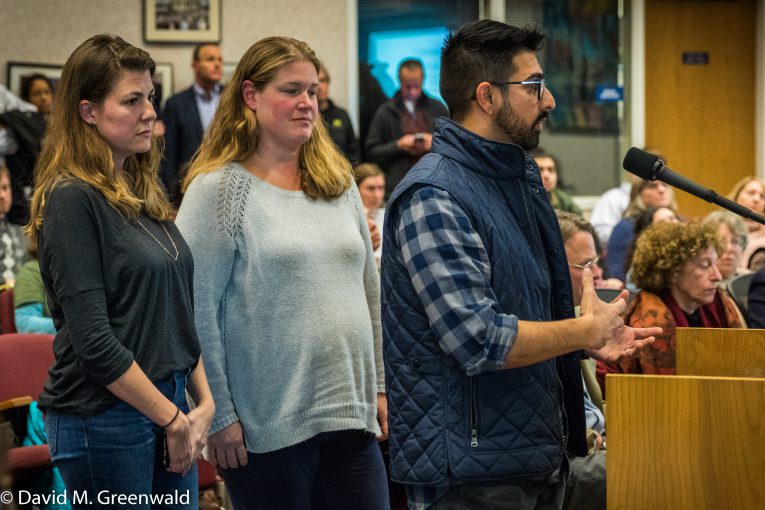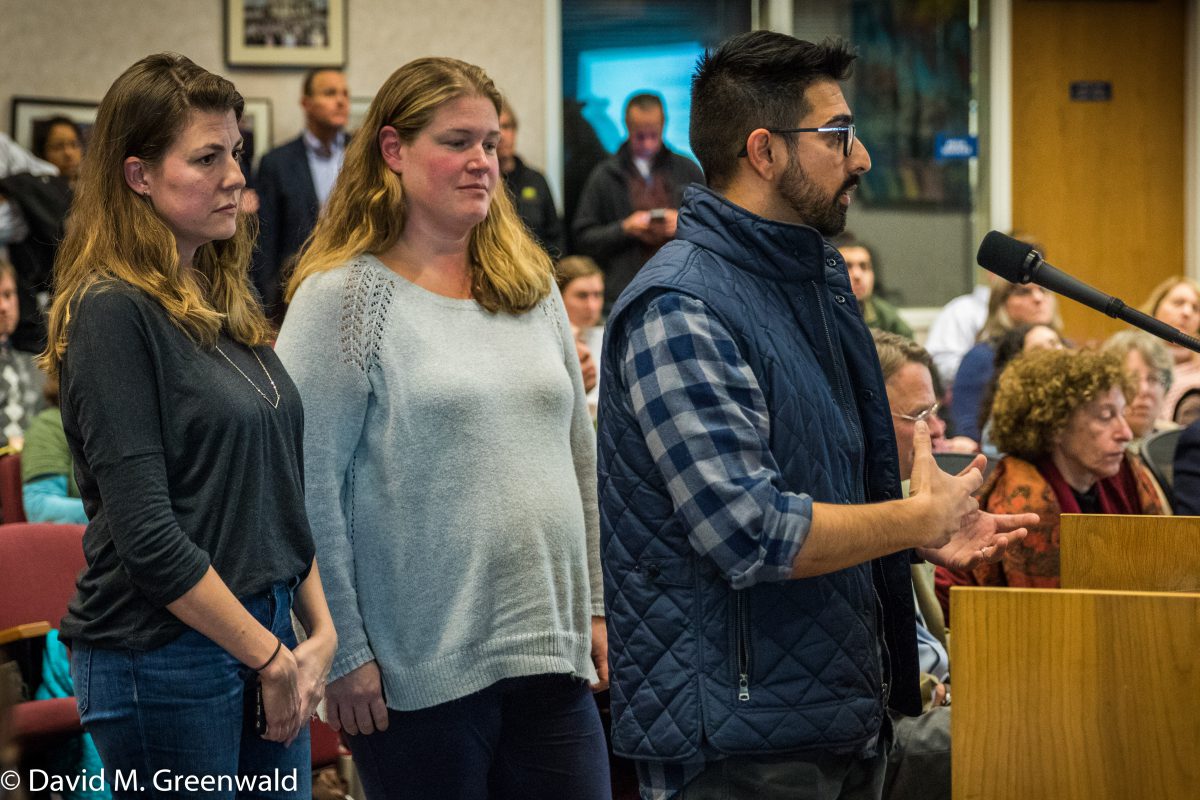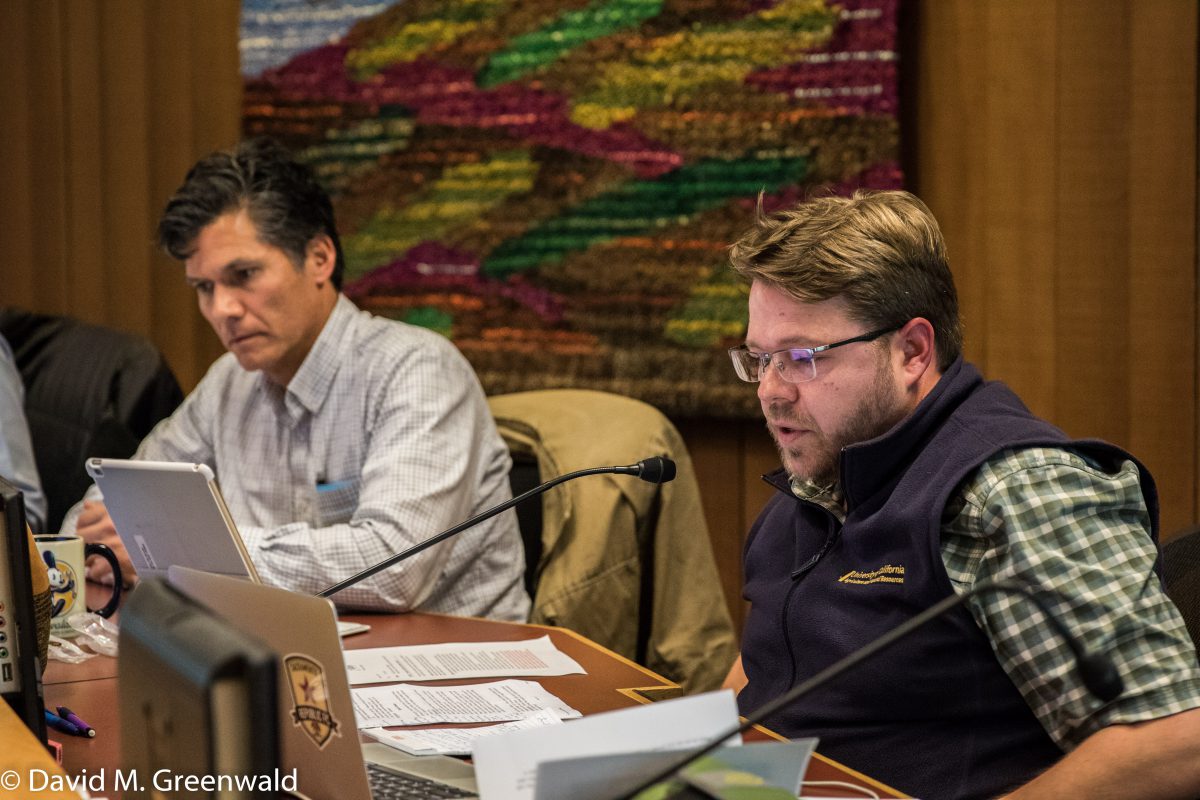

What began as one of the most contentious issues facing this community ended with unanimous support from the council – and backing from groups as diverse as labor, the Davis Chamber, environmentalists and budget hawks.
Mayor Pro Tem Brett Lee called the compromise “remarkable and surprising,” stating that it “makes my job up here tonight much easier.”
Councilmember Will Arnold pointed out that when he urged the neighbors and applicant to meet one more time with facilitated discussions, he didn’t think we would get this close to an agreement. He called the final arrangement “even beyond my hopes,” and hoped that this could become a model for future neighbor-applicant interactions.
Neil Dhanowa, Alissa Burnett and Bridget Boyd spoke to council. Ms. Boyd stated, “While the neighbors still feel that this hotel is in the wrong location, and it may be too big for the lot planned, we want to support the community as a whole by working together helping the city obtain tax revenue needed.”
She said, “Therefore we have come to an agreement to support the compromise presented tonight.” She noted, “We’re asking the city to help fund our neighborhood improvement.
“The post community benefit agreement will help to bring value to our neighborhood and help to offset any negative effects that the hotel may have on our neighborhood,” she said, noting that neighbors are still a bit divided on the agreement and it has been their job to help bring people together in the middle. “So there may be people who speak differently tonight, but I feel as a whole we’ve come together as a neighborhood and are okay with the compromise as long as the funding goes through.”
Neil Dhanowa indicated that considering outside issues of noise and massing size was to figure out a way to “sustain value as a community for as long as the hotel was there in business.” He said that “we found that this was a good way to do it.” He noted that, while “the desire was to have the funds be larger, we were able to come to a compromise that the developer felt comfortable with.
“We have an area of town that is truly unique. It’s not just for us, but it’s for anyone else in the community that wants to partake in it. That’s truly what we’re trying to achieve,” Mr. Dhanowa added.
The original project was proposed at four stories and 120 guest rooms. The neighbors from the start were concerned with privacy, about the top stories looking into the neighbors’ homes which abut the greenbelt, the sufficiency of the greenbelt trees to buffer the neighborhood, and the noise factor from a 24/7 establishment.

At a second meeting between the neighbors and applicants, the development team presented a redesigned building that eliminated all fourth floor rooms that faced south toward the neighborhood by incorporating a single-loaded corridor at the rear of the fourth floor, with the remaining guest rooms facing north with views toward Cowell Boulevard.
The redesign reduced the height in the rear to 37 feet from 48 feet, and overall reduced the room count from 120 to 118 rooms. As noted in the letter the Vanguard published on Tuesday, of “general consensus is a frustration that even though the design was altered in size to be 3 stories in the rear and 4 stories in the front, the overall size of the hotel being only reduced 2 rooms down to 118 rooms was a sore subject, as well as the pool being a requirement of the property.”
According to them, “The feelings were that even with the proposed changes the project/development team was not truly making a sacrifice in the same manner that the neighborhood was by effectively ‘giving something up.’”
However, as the neighbors noted, the key to agreement was twofold. First was the $1 per night contribution that would go to the park and greenbelt maintenance, and second the one-time contribution to the Rose Creek fund that included a city contribution of $150,000 to $200,000 from the general fund.
The neighbors in their letter indicated that “if all of us can get the city to agree to an immediate contribution, or allocation, as outlined above to be used to completely renovate Brentwood Park, we will not oppose the project moving forward.”
The council took this up in a separate motion after they had unanimously passed the hotel with modifications.
Neil Dhanowa explained to council, “If you can make it really simple and say we will allocate $150,000 to renovating completely Brentwood Park at the end of Brentwood Place in conjunction with the funds that are part of this project – we would be happy, as simple as that.”
The motion ultimately read, “[W]ithin the context of the park five year improvement plan, we direct staff to return with improvements in the range of $150,000” with staff directed to work with the neighborhood to develop a list of improvements and amenities for major improvements. Council also approved this unanimously.
During public comment, Alan Pryor complained about the process where “at the last meeting, we heard several councilmembers essentially threaten the neighborhood that if they didn’t get behind this project something worse could come along. In fact, we were told that we have to sacrifice for the greater good.”
He said, “The residents got that loud and clear and in fact I think you emboldened the developer with that statement. They knew this was going to come back and eventually be approved. I think that was really over the top on the council’s part.”
He said that we know that times are tough and “my question is who else is going to be sacrificing in this city? There’s really no give by the developer here.”
However, for the most part, everyone seemed to feel that this process was beneficial and that it came far closer to yielding true agreement than anyone really anticipated when the discussion came up two months ago.
Mayor Pro Tem Brett Lee said that, six weeks ago, he had serious reservations about the project and that one of the dilemmas with sitting up at the dais is “we kind of have to balance a variety of interest groups.”
He said, “What I think is remarkable and surprising to me is that the neighbors and the developer we able to come together and work out a compromise that both feel is functional and reasonable. It makes my job up here tonight much much easier. If there was still a large divide, it would have been a much more contentious discussion up here.”
Will Arnold quipped, “I don’t typically pat myself on the back, mostly because I can’t reach.” He said, “When I made the suggestion that we have a facilitated meeting between the project applicant and the neighbors as the condition of my approval of this project, it was met with some skepticism by my colleagues and others.”
He added, “But these meetings were successful and we have an agreement that I don’t think that anyone – I will even admit that I didn’t think we were going to get to this close. I thought that hopefully we would get very close, but I think to have the neighbors come up and say we’re okay with this as it is, it was even beyond my hopes.”
Mr. Arnold stated, “We do have precedent now for how we’re going to deal with some of these other contentious projects that we now are going to see on the horizon.”
He said, “I am floored by the results. It was a successful facilitation. An agreement was reached.”
Councilmember Lucas Frerichs also praised the outcome of the mediated process, stating that “overall it’s going to be a really good project and a benefit to the community.”
Once again, both motions passed unanimously with 4-0 votes. Rochelle Swanson, who lives in the neighborhood, recused herself.
—David M. Greenwald reporting

“While the neighbors still feel that this hotel is in the wrong location, and it may be too big for the lot planned, we want to support the community as a whole by working together helping the city obtain taxes revenue needed.””
It seems to me that this example, and that of Paso Fino, demonstrate that when both the affected neighborhood and the developers are willing to work collaboratively as opposed to entrenching behind their preferred positions, agreement can be reached. I would like to suggest that the earlier in the process this attitude is adopted, the less contentious, time consuming and expensive the process is likely to be. Congratulations to all involved.
There are a lot of good things that came out of this. This was extremely toxic, venomous, a divisive and by the end, they were able to get everyone to come together and come up with a solution they could live with.
My concern is that there are people who simply will not come to the table at all on a given project. I would also point out that this only took place when the council made it obvious that a project would be approved and therefore the neighbors knew that “no” project was not possible and therefore they had to get the best deal they could for their neighborhood. Could they have come together sooner?
Last night, during public comment, Kemble Pope basically conceded on Trackside, for example, that consensus was not possible, that the neighbors were set on two stories and he considered that a non-starter. How do you get passed that apparent type of impasse.
Bottom line: I think there are elements here that can solve these disputes, but I’m not sure how to get passed that initial impasse.
David
“Could they have come together sooner?”
I believe that this is the key. Much earlier communication about the developer’s plans are likely to be better received by the neighbors who will not feel sabotaged. I think that Paso Fino is a good example of compromise without a threat hanging over anyone’s head…..at least as I understood it.
“I think there are elements here that can solve these disputes, but I’m not sure how to get passed that initial impasse.”
I have said this before and am sorry if everyone is tired of hearing it. I believe that the bet way to “get past an initial impasse” is not to create one in the first place. Early and frequent communication starting long before vast amounts of time, money and energy have been invested would seem to me a reasonable approach which I know is not the way things have been done here. But, then again, why not try a different approach since the current one is so very contentious.
It also opens wide the door, that if a project proponent who wants X proposes 5X, and opponents’ original position will be 1/5 X… that is not collaboration… it’s playing “let’s make a deal”… the collaboration I believe you seek, assumes multiple parties, acting in good and honest faith… their ‘agendas’, needs, transparent…
Trust me on this… that rarely happens… look at the allegations made in this process… increased crime, danger to children, noise, etc. So, how did those concerns go away with the reduction of 2 units, a partial enclosure for the pool and modest changes to height? Were those concerns “real”?
Probably to the same extent as ‘concerns’ that 2-3 million fraudulent votes were cast in November… yeah Trump just didn’t just win the electoral college, he won the popular vote and everyone who believes otherwise is part of a conspiracy…
I think the council learned a lot of about how to structure things going forward. The question is really going to be whether they can structure things right away to get both sides talking. I do think the fact that the council basically said they were going to approve the project changed the game. But other than Measure R votes, I think that’s pretty much always the case.
Amazing how Trump even manages to get dragged into the Davis Hyatt Hotel conversation.
I think this is the important point. Up to that time, the neighbor’s approach was one of obstruction, doing and saying anything to prevent the project from moving forward. Prior to the CC’s decision, the neighbors refused the offered engagement because their only goal was ‘no project.’ Once the decision was made, their tune changed to ‘what’s in it for me?’ Instead of forcing the two parties back to the table for one last round of extortion, the CC should have told the neighbors that their refusal of engagement meant that they had forfeited their voice. There should have been consequences for their obstruction, which would have told all that engagement from the start was the right course. Instead, what we have is a CC that has rewarded the neighbor’s bad behavior, and as a consequence, have added yet another level of pain to the City’s ‘spanking machine.’
EXACTLY… come to the table in an honest way, or get nothing. Jumping in after costing everyone time and $ shouldnt be allowed.
Howard
“Trust me on this… that rarely happens… look at the allegations made in this process… increased crime, danger to children, noise, etc. So, how did those concerns go away with the reduction of 2 units, a partial enclosure for the pool and modest changes to height? Were those concerns “real”?”
I think that you have a much more cynical outlook on this than I do. I think that all of those concerns may have been a legitimate or “real” concern for some, but not all of the neighbors. Using the Trackside as an example in which I have quite a bit of experience. When we first started our community discussion, I had a number of issues that people who were more experienced in planning, design or construction were able to persuade me were not as I had initially seen the issue. This was also true for the Lincoln40 project. Early discussions frequently involve half baked ideas and unrealistic concerns. I believe that most people are rationale and acting in good faith and will change their mind when presented with better information than they might not have access to or experience with. I believe that this “rarely happens” because people do not believe that it can be done and/or do not believe that those with differing viewpoints are not acting in good faith. With gradual adoption of a more collaborative and less combative process, I believe that over time, people could note examples where it was helpful and gain some confidence in a more collaborative process as a more constructive model.
I started watching late last night towards the end of this issue. The article doesn’t clear up my confusion: the city will pay $150K out of general fund and hotel will contribute $1/guest or per night?
I am glad there was evident happy outcome for all parties but is no one worried about the precedent here? Tgat the city will be asked/forced to pony up when there is disagreement? Was that discussed by council?
So when will the Trackside “negotiations” commence?
I didn’t watch the meeting but I’ll bet they avoided that discussion like the plague.
Actions speak louder than words… if that occured (City making up the difference), precedent has been set, and we will negotiate with the …… ones inclined to oppose things… if given the choice between corruption and extortion -that’s a hard call… I oppose both…
I agree, but you would think that a discussion would’ve come up since this is setting a new precedent that I’m sure other neighbors will take advantage of in the future.
Howard
“if given the choice between corruption and extortion -that’s a hard call… I oppose both…”
As do I. However, I do not see that as a binary choice. I believe there is a choice between corruption, extortion, and collaboration with my choice being the latter.
Hi Dianne,
“the city will be asked/forced to pony up when there is disagreement? “
I see this from a different perspective. If the city is anticipating a large benefit as a whole, but there will be acknowledged disparate adverse consequences for the immediately adjacent neighbors, it does not seem to me like a negative “ponying up” but rather as a reasonable compensation to those most negatively impacted. Ideally, I would like to see this coming from those who will profit the most directly, namely the developers and investors, in a spirit of sharing the benefits. But barring this, I think it is entirely reasonable for the entire community which is benefitting to compensate for the loss to those who are taking the biggest “hit” for the common good.